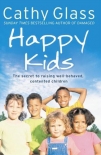Happy Kids, Cathy Glass [best ebook reader for ubuntu .TXT] 📗

- Author: Cathy Glass
Book online «Happy Kids, Cathy Glass [best ebook reader for ubuntu .TXT] 📗». Author Cathy Glass
When they come into care and are finally relieved of the huge and inappropriate burden they have carried all their lives, they can regress dramatically in the first few months. An eight-year-old will return to crawling rather than walking, eating with his fingers, wanting a dummy or bottle, baby talking, wetting and soiling himself, and generally acting like a toddler. I allow much of the child’s regressed behaviour in the first few months, as they settle in and begin to adjust to the new environment and feel safe. It can be quite unsettling to have a sturdy nine-year-old boy crawling on all fours, babbling baby talk and wanting to be picked up and carried like a baby. However, I know from experience that the child will gradually work through the developmental stages he or she previously missed, and will catch up again.
Such behaviour underlines just how important these early developmental stages are for children, particularly the time to be a child and play. If deprived of childhood, then given the opportunity, the child instinctively sets about working through these stages before they can go forward and develop. If a child is permanently deprived of a childhood and never given the opportunity to catch up, it can produce emotional and psychological problems in adulthood. Some therapy encourages regression, with the therapist helping the adult client to feel and work through these early years’ stages.
Nursery anxieties
Children may need a lot of reassurance at this age, particularly when they first start nursery. So if, for example, Tom is refusing to get ready in the morning because he is worried about going to nursery, then talk to him about his concerns while you help him dress, and again for longer in the evening when there is more time. Your child will find comfort in the knowledge that you are tuned into his or her fears and can offer support and suggestions. Spend a lot of time talking and listening to your child at this age, and include in your conversation general talk about nursery, during which it is likely you will be able to pick up concerns your child may have and reassure him or her.
Be on the lookout for hidden worries. If a previously well-behaved child suddenly becomes wilfully challenging, has tantrums, refuses to get dressed ready for nursery or starts bed-wetting, hear warning bells. It could be that your child is anxious about something but doesn’t like to say. Even the most outwardly confident child will have some worries when starting nursery and may well feel too embarrassed to tell you, believing his or her worries are foolish and not experienced by others. It’s surprising what little things can seem huge to a child at this age:
I can’t remember the teacher’s name.
I don’t know how to switch on the tap in the washroom.
Who will help me do up my coat?
Matthew said there’s a ghost in the playhouse.
No one likes me/No one will play with me/I haven’t got any friends.
Wayne pinches me.
Lucy won’t let me join in.
What if I wet myself?
Treat your child’s worries seriously, and never laugh at or minimise them, even if they appear ridiculous: they are not ridiculous to the child. Reassure your child by answering any questions such as ‘Must I drink my milk at break time?’ and if you don’t know the answer, find out by asking the nursery staff the question your child doesn’t feel able to. Be in close contact with the nursery staff and make them aware of any concerns that your child might have which you haven’t been able to deal with simply by reassuring your child.
Behaviour and character
A child becomes autonomous – i.e. a self-governing individual with freedom of action – almost from the day he or she is born. Gone is the early Victorian attitude where young children were viewed as objects, lacking the adult capability to think, feel and make decisions; now we recognise that a child is an individual who is developing his or her autonomy right from the beginning and we respect his or her character. This is far healthier, but more demanding for the parents, than the Victorian ‘seen and not heard’ approach. There is a leap in autonomy when the child becomes mobile, and another huge leap when he or she starts preschool. Although seeing your child turning into a self-regulating individual with character is exciting, and a reward for all your love and attention, it can also be very challenging if your child’s character doesn’t fit snugly alongside yours or your partner’s, which it won’t sometimes.
The more your child’s world opens up, the more autonomous he or she will become, and the more obvious his or her individuality. Your child’s character, including his or her likes, dislikes, temperament, wishes, demands and refusals, all go together to make up your child. Many of your child’s character traits will gel happily with yours, while others may make you wonder exactly who this little person is. How often do you hear a shocked parent exclaim, ‘Where did that come from?!’ or ‘Where did he get that?!’ in relation to a trait in a child’s character (positive or negative) that is not part of the parent’s behaviour. Some of this will simply be part of the child growing up and experimenting with how they want to be, but other aspects will be the child’s character forming – his or her individuality and personality, which you will accommodate while maintaining the boundaries for good behaviour.
Children are not cloned; they are not physically identical to their parents. So there is no reason





Comments (0)